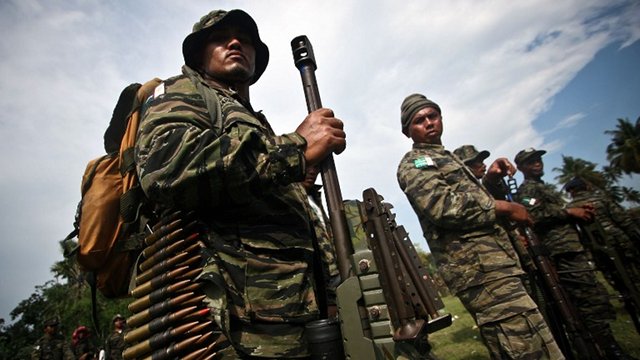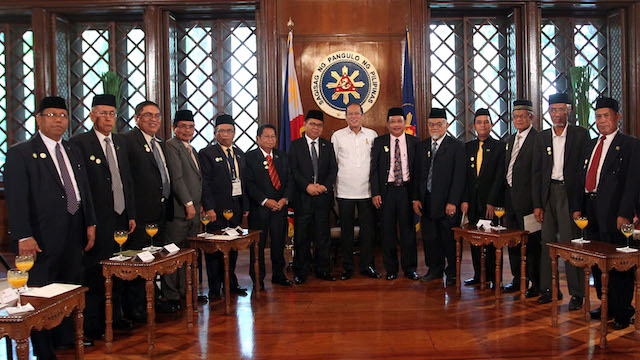SUMMARY
This is AI generated summarization, which may have errors. For context, always refer to the full article.

MANILA, Philippines (Updated) – After the signing, the groundwork begins. Rebels will soon have to give up their firearms, while politicians must do their share to craft and pass a law that makes peace more acceptable than war.
The success of the peace deal signed Thursday, March 27, by the Philippine government and the Moro Islamic Liberation Front (MILF) depends largely on the ability of the Aquino administration to prevail upon Congress to pass the Bangsamoro law in the spirit that the panels agreed on and, equally, on the sincerity of the MILF to drop the armed struggle. (READ: ‘Bangsamoro deal illegal, creates substate’ – Miriam)
“Hindi komo nagpirmahan na, tapos na. Hindi. May mga stages pa ‘yan eh. Mga phases,” Defense Secretary Voltaire Gazmin told reporters in an interview in March. (They may have signed but it’s not over yet. There are stages. There are phases.)
The government and MILF panels envision a new order in the areas notorious for decades-long conflict. Where guns are said to be more valuable than wives, MILF fighters will lay down their arms to a third party. Where the infamous Ampatuan massacre happened, private armies will be disbanded.
Military presence in the region will be reduced. Peace and order will be the responsibility of the yet-to-be-created Bangsamoro Police Force, which is civilian in character. (Read the program for normalization in the Bangsamoro below)
This has never been done in post-war Philippines – in the scale that the agreement envisions.
The MILF claims to have 11,000 combatants, although this will now be the subject of verification. They are concentrated in the MILF’s bailiwick, central Mindanao, although some units are also in western Mindanao. Other threat groups like the rogue Moro National Liberation Front (MNLF) members and the private armies will have to be disarmed, too.
Military troops are also concentrated in Mindanao – Western Mindanao Command (Wesmincom) and Eastern Mindanao Command (Eastmincom) – because of the threat groups there. The 6th Infantry Division that covers MILF bailiwick central Mindanao has 6,000 troops.
It won’t be easy
Until the Bangsamoro Police Force is set up, the military and the MILF will be jointly tracking and documenting private armies and other armed groups, controlling the flow of loose firearms, and making sure ceasefire is sustained.
The MILF command has to explain to its members what is at stake and what they must do for peace, Gazmin explained.
Decommissioning is the part where the MILF is expected to exert more effort because it won’t be easy.
“Everybody is observing. The ball is with the MILF. The burden of proof is on them,” said a military officer who spent years in central Mindanao. He refused to be named because he is not authorized to speak on the issue.

A lot hinges on what will happen to the Bangsamoro Islamic Freedom Fighters (BIFF), the breakaway group of the MILF opposed to the deal. The officer said both panels cannot allow the BIFF to grow and become the new MILF, referring to the latter’s split with the MNLF in the 1970s. The MILF would grow to become the more dominant rebel organization.
Colonel Dickson Hermoso, spokesperson of the 6th ID, is confident that BIFF has weakened. With the help of the MILF, the military last month overran BIFF camps and set up detachments to make sure the BIFF won’t return to the area. (READ: Military sets up detachments in captured BIFF camps)
“Some of them might even go back [to the MILF],” he told Rappler.
The military officer also thinks the MILF should take the lead in future operations against BIFF, other threat grous, the private armies and even in rido or clan wars that are prevalent in these areas. The members of these peace “spoilers” are their own relatives or friends, the officer said.
“If the MILF fails to address this, then we are back to square one,” he said.
Realistic expectations
Military officers interviewed by Rappler are realistic about the challenges ahead, given the peace agreement’s ambitious timeline. The signing is the first step in a process that, they say, will take time.
“I don’t think it will happen [complete decommissioning]. There will be an attempt to do it. They are all armed. We are talking about changing a culture and tradition. It won’t be so easy,” said the military officer.
“If you can demobilize them by 50%, that will be great,” said another officer.
The current cooperation between government forces and the MILF is already a success “that could not have been imagined 10 years ago,” he added.
Hermoso, who hails from Cotabato City, is celebrating. “Being a stakeholder, I have high hopes. There are new challenges in ending the 4-decades long conflict but the confidence is high. You can feel that the communities are very supportive,” he said.
An officer assigned in the area in the 1990s recalled how bitter the relationship was between the military and MILF commanders. Today, he noted, these commanders have become friends, sharing stories of their previous encounters.
This is a marked change from the conditions that gave rise to the all-out war against the MILF more than a decade ago, when Joseph Estrada was president. During that bloody campaign, the military crushed Camp Abubakar, the main headquarters of the MILF, and closed all avenues to peace.
Part of the change can be attributed to how Filipino soldiers have learned to respect Muslim culture.
“There is a realization also that the problems of insurgency are multi-faceted. It is not the military alone that can solve the problem. There are economic issues, political, religion. It’s complex that there are legislative issues that need to be answered,” added military spokesman Lieutenant Colonel Ramon Zagala.
The Ampatuan massacre in 2009 – the world’s worst case of election violence that embarrassed the military – may have been the catalyst that forced the military to reflect and give the peace process a chance.
Military men in the area were accused of enjoying cozy ties with the Ampatuan clan. The Ampatuans, on the other hand, were believed to have been used by the military to run after the MILF.
“It was a turnaround. It was a moment of opportunity. I cannot explain it. It changed the attitude of soldiers. Ten years ago, it was a question of who has the most guns. After the massacre, it was different,” said the military officer.
Warehouse
Decommissioning is the most emotional issue for the MILF.
In the words of its chief negotiator Mohagher Iqbal, the MILF ceases to exist as an armed group and starts positioning itself as a “social movement.” (READ: What happens to MILF after peace deal?)
“All the agreements are substantive and important and very, very hard, but the issue of normalization is the most sensitive, emotional…As far as I know, it entails a lot of sacrifices on the part of the MILF because to build real peace in Mindanao, we have to decommission our forces,” Iqbal said.
The wording is carefully selected. It’s not disarmament, which implies surrender. Decommissioning means MILF firearms will be put “beyond use,” probably stored in a warehouse, depending on the recommendation of the Independent Decommissioning Body (IDB).
In contrast, when the MNLF signed a peace agreement with the Ramos administration, there was no demobilization or disarmament plan. “There was only the plan of integration. We cannot integrate them all,” recalled Zagala.
MNLF fighters joined the police and the military, but not all were qualified. Those who were not integrated managed to keep their firearms. In due time, the disgruntled ex-rebels returned to fighting government.
Convinced they were left out in the peace process, MNLF rebels seized Zamboanga City in September last year, paralyzing the city and causing the worst security nightmare for the Aquino government.
The siege of Sabah by the Royal Security Force of the late Sulu Sultan Jamalul Kiram III was also linked to the peace process because it was mounted by former MNLF members who had complained of the MILF’s silence on the Sabah issue. – Rappler.com
Add a comment
How does this make you feel?





There are no comments yet. Add your comment to start the conversation.